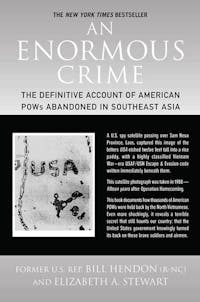An Enormous Crime
The Definitive Account of American POWs Abandoned in Southeast Asia
 Download image
Download image
ISBN10: 0312385382
ISBN13: 9780312385385
Trade Paperback
608 Pages
$32.99
CA$46.50
Based on thousands of pages of public and previously classified documents, An Enormous Crime is the dramatic history of living American soldiers left in Vietnam, and the first full account of the circumstances that left them there. It makes an utterly convincing case that when the American government withdrew its forces from Vietnam, it knowingly abandoned hundreds of POWs to their fate. The product of twenty-five years of research by former Congressman Bill Hendon and attorney Elizabeth A. Stewart, An Enormous Crime exposes the reasons why these American soldiers and airmen were held back by the North Vietnamese at Operation Homecoming in 1973 and what these men have endured since.
An Enormous Crime is based on open-source documents and reports, and thousands of declassified intelligence reports and satellite imagery, as well as author interviews and personal experience. It is a singular work, telling a story unlike any other in our modern history: ugly, harrowing, and true.
Reviews
Praise for An Enormous Crime
"A sprawling indictment of eight U.S. administrations. The charge: sacrificing American war prisoners in the interest of focusing, as Bush aides have said, 'not on Vietnam's past but on its future.' Beginning in 1966, write former Rep. Hendon (R-NC) and attorney Stewart, GIs captured in South Vietnam were moved north along the Ho Chi Minh Trail and other routes. Cataloguing sightings with the diligence of Vincent Bugliosi-whose Reclaiming History on the JFK assassination is something of a companion piece—Hendon and Stewart reckon that hundreds of POWs had crossed the Demilitarized Zone by the time of the Tet Offensive, their numbers swelled by pilots downed over North Vietnam. Many of these soldiers, Hendon and Stewart charge, were used as human shields against American bombing attacks on power plants, military headquarters and other strategically important venues. North Vietnam and its allies in Laos and Cambodia weren't particularly forthcoming on all these things, but the U.S. played a dirty hand, too; by the authors' account, the prisoners' ultimate release was bound up in negotiations conducted by Henry Kissinger, "the surrogate president," who reneged on promises of U.S. aid owing to supposed violations of previous accords, thus closing off a diplomatic channel for repatriation. Fast forward to 1987, when Ross Perot traveled to Vietnam and told the foreign minister, who insisted that there were no POWs there, 'Don't embarrass yourselves, I know too much.' Fruitful negotiations ensued, the authors report, only to be brushed aside by the Reagan administration-even though, they claim, at least 100 U.S. prisoners were still alive in Vietnam. Hendon and Stewart, who appear nonpartisan in their disdain for governmental inaction and double-dealing, close by offering advice to President Bush to send an army of former presidents and their staffs to negotiate the release of the remaining captives . . . A convincing, urgent argument."—Kirkus Reviews
"Controversial former North Carolina congressman Hendon and attorney Stewart make the case that the U.S. knowingly left hundreds of POWs in Vietnam and Laos in 1973, and that every presidential administration since then has covered it up. The main reason for the secrecy, say the authors, is the billions in war reparations demanded by the Vietnamese and promised by Henry Kissinger and Richard Nixon at the Paris Peace talks. Hendon and Stewart provide a mountain of evidence, mainly intelligence reports of live sightings of American prisoners in Vietnam and Laos . . . riveting sections describe Hendon's crusade on this issue in the early 1980s, including two meetings with President Reagan, pleading his case that the government free the live POWs. Hendon and Stewart directly accuse a long list of government officials of the coverup. Among the most culpable: Kissinger, President George H.W. Bush, Senators John McCain and John Kerry, Gen. Colin Powell, former secretary of state George Schultz and former defense secretary Donald Rumsfeld . . . the descriptions of Hendon's unsuccessful personal mission provide an intriguing story—and carry the ring of truth."—Publishers Weekly
Reviews from Goodreads
BOOK EXCERPTS
Read an Excerpt
An Enormous Crime
PART I
INTRODUCTION
After months of training at secret bases in Guatemala, twelve hundred Cuban freedom fighters departed in ships from Puerto Cabezas, Nicaragua,...


